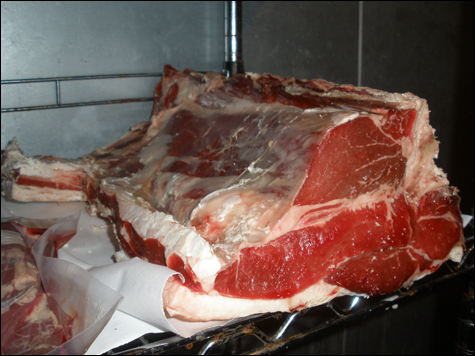
AS LOCAL AS IT GETS Fresh Maine beef. |
Opening the door to a large walk-in cooler and seeing a massive cow carcass hanging from a metal hook is a slightly jolting reminder that meat doesn't just appear in neat little packages in the grocery store. This particular cow was raised in fields just down the road at Little Alaska Farm and is awaiting processing at Farmers' Gate Market, a full-scale butcher shop here in Wales, Maine, about 10 miles outside of Lewiston.
But there's a lot more to this butcher shop than cutting up and selling meat. It is the goal of owner Ben Slayton to develop a network of local farmers to process and sell their products around Maine and to do so in a sustainable, healthy, and ethical way. As a butcher, Slayton considers it his job to connect farmers with customers. Knowing more about the farm where animals are raised gives people peace of mind and "it takes the guilt away that lots of people are having with the meat industry," he says.
But getting people access to local, pasture-fed beef like what's hanging here isn't easy, especially considering Wales isn't exactly a thriving metropolis (in all its 1322-resident glory). So Slayton has made it his business to get meat products from small, local farmers out in front of a larger customer base. He is currently working with 12 local farmers to sell a bevy of bounty, including pasture-raised pork and lamb, chicken, free-range eggs, and dairy products. But he's had to come up with some creative ways to get these locally raised animals to the dinner tables of Mainers.
While selling through farmers' markets seems like the easiest route to take, until very recently, livestock farmers have had very limited presence at markets around the state, and remain far outnumbered by their vegetable-farmer counterparts. They also aren't nearly as prevalent in other direct-to-customer efforts such as community-supported agriculture (CSA) programs. And while this is bound to change in coming years, many of the small farmers just don't have the resources necessary to dedicate to marketing and selling their products. That's where Farmers' Gate Market comes in.
One of the most successful ways Slayton has found to sell such products has been to take it directly to the tables of his customers, and to the tables of their friends, colleagues, and neighbors. Last year, Farmers' Gate Market participated in about 20 "Meat Ups," gatherings of people to buy and discuss various local meats. Think Tupperware party for meat. Slayton works with the host to put together a product list for attendees to pre-order meats and then donates some product for people to sample during the party. Often he brings a farmer along to meet customers.
While inviting people to Meat Ups has been largely the responsibility of the host, Slayton said he hopes to grow the events by posting information on the company's website about future Meat Ups so people in the area can join. Not only is it an opportunity to expand his network of customers, but it also reduces the miles people have to travel to buy local products. "We wanted to limit the miles each piece of meat travels," he says. His goal is that no product travels more than 100 miles, from farm to table.